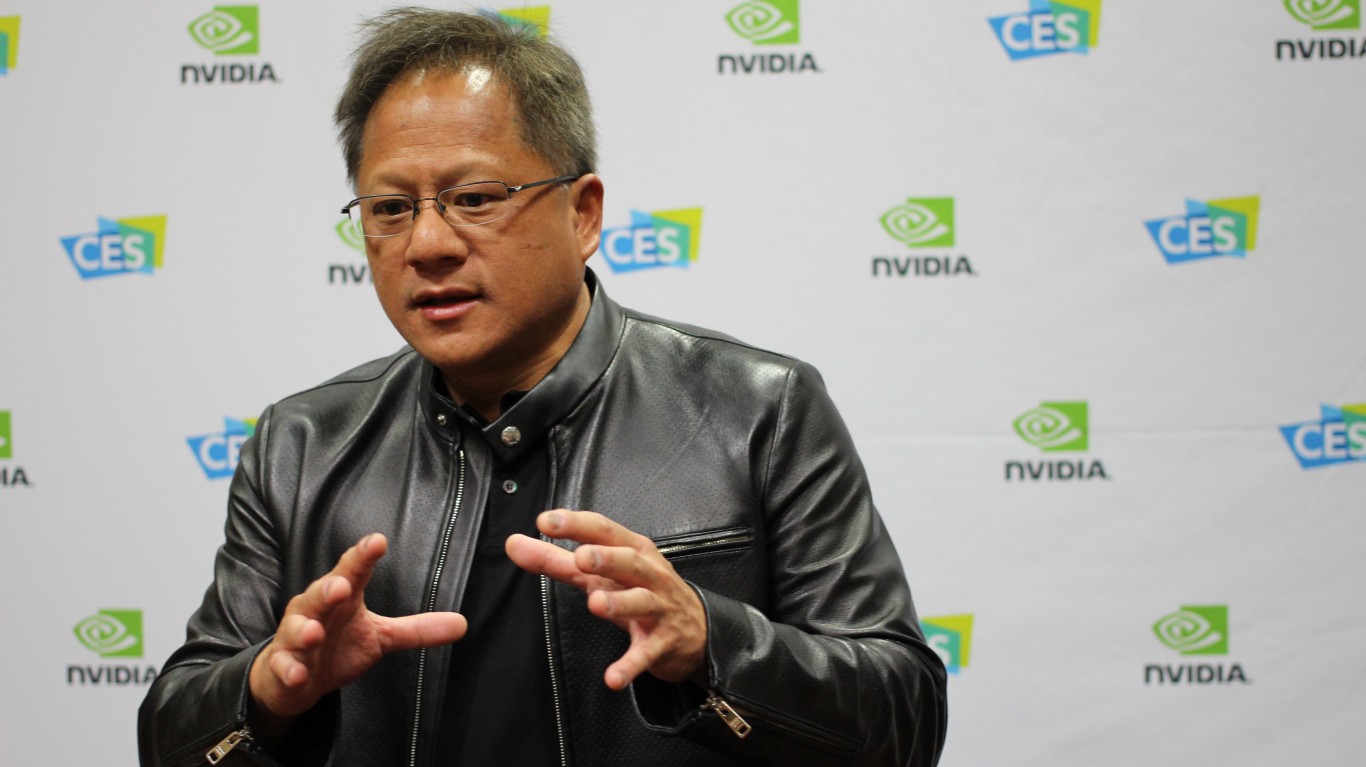
We can put up with some bragging from Nvidia Corp. (NASDAQ: NVDA) CEO Jensen Huang. After all, the company reported second-quarter results Wednesday that blew past consensus estimates and then roared past forecasts for the current quarter and the rest of its 2024 fiscal year.
[in-text-ad]
Briefly, Nvidia reported record revenue of $13.51 billion, up nearly 90% sequentially and 101% higher year over year, well beyond a consensus estimate of around $11.20 billion. Adjusted earnings per share came in at $2.70, nearly 30% above the consensus estimate and up from $0.51 in the year-ago quarter.
Huang should get to crow a little:
A new computing era has begun. Companies worldwide are transitioning from general-purpose to accelerated computing and generative AI.
NVIDIA GPUs connected by our Mellanox networking and switch technologies and running our CUDA AI software stack make up the computing infrastructure of generative AI.
During the quarter, major cloud service providers announced massive NVIDIA H100 AI infrastructures. Leading enterprise IT system and software providers announced partnerships to bring NVIDIA AI to every industry. The race is on to adopt generative AI.
As if to prove his point, the company forecast third-quarter revenue of around $16 billion. Adjusted gross margins are forecast at around 72.5%, up from 70.1% in the second quarter. To top it off, Nvidia has authorized an open-ended share buyback program of $25 billion, added to the $3.95 billion remaining in its existing stock repurchase program.
Qui bono? Who benefits? To begin with Nvidia’s main rival, Advanced Micro Devices Inc. (NASDAQ: AMD). Although AMD’s second-quarter revenue was less than half Nvidia’s, AMD announced a new graphics chip, the MI300X, in June to compete with Nvidia’s top-of-the-line H100. Analysts have been cautious about projecting explosive growth for AMD. The current forecast for 2023 revenue is about 3.3% below the 2022 total. For fiscal 2024, revenue is forecast to rise more than 20% compared to this year.
Perhaps a less obvious beneficiary is Softbank and its proposed IPO of Arm, the company that gets a royalty payment from Nvidia every time an Nvidia chip is sold. Softbank filed a preliminary prospectus earlier this week, and even though the numbers are missing, it is no secret that the company is seeking a valuation of $60 billion to $70 billion, well above the $40 billion offer from Nvidia that was squashed by regulators last year. Arm’s position as a technology supplier to Nvidia is unlikely to do anything but get stronger.
The other tech giants are riding Nvidia’s wave as well. The Nasdaq Composite was up 1.2% in Thursday’s premarket session; Apple shares traded up about 0.5%; Microsoft traded up nearly 2%; Meta Platforms was up 2.0%; Google added 1.2%; Tesla traded up 1.8%; and Amazon was 1.3% higher. Chipmaker Marvell Technology, which reports quarterly results after markets close Thursday, was up more than 4%; Taiwan Semiconductor, the company that fabricates Nvidia’s chips, was up 2.7%; and ASML, the company that builds the machines that Taiwan Semi uses to fabricate Nvidia chips, was up 1.1%.
And what about Nvidia? Its stock traded up more than 8% in Thursday’s premarket.
Are You Still Paying With a Debit Card?
The average American spends $17,274 on debit cards a year, and it’s a HUGE mistake. First, debit cards don’t have the same fraud protections as credit cards. Once your money is gone, it’s gone. But more importantly you can actually get something back from this spending every time you swipe.
Issuers are handing out wild bonuses right now. With some you can earn up to 5% back on every purchase. That’s like getting a 5% discount on everything you buy!
Our top pick is kind of hard to imagine. Not only does it pay up to 5% back, it also includes a $200 cash back reward in the first six months, a 0% intro APR, and…. $0 annual fee. It’s quite literally free money for any one that uses a card regularly. Click here to learn more!
Flywheel Publishing has partnered with CardRatings to provide coverage of credit card products. Flywheel Publishing and CardRatings may receive a commission from card issuers.
Thank you for reading! Have some feedback for us?
Contact the 24/7 Wall St. editorial team.

 24/7 Wall St.
24/7 Wall St.



